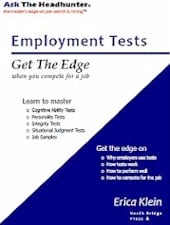The October 29, 2013 Ask The Headhunter Newsletter is the 500th edition. So rather than answer a reader’s question, I’m celebrating this milestone by making up my own question, and doing my best to answer it.
(What? You don’t subscribe to the free, weekly e-mail Ask The Headhunter Newsletter? Don’t miss the next edition! Subscribe now!)
WTF is going on with employment in America?
Why have I written and published 500 weekly editions of the Ask The Headhunter Newsletter? Because America’s employment system still doesn’t work.
 The emperor still has no clothes, and that’s why over 25 million Americans are unemployed or under-employed. (According to PBS NewsHour, that’s how many Americans say they want but can’t find a full time job.) Meanwhile, according to the U.S. Department of Labor, there are about 3.9 million jobs vacant.
The emperor still has no clothes, and that’s why over 25 million Americans are unemployed or under-employed. (According to PBS NewsHour, that’s how many Americans say they want but can’t find a full time job.) Meanwhile, according to the U.S. Department of Labor, there are about 3.9 million jobs vacant.
HR executives have a special term for this 6:1 market advantage when they’re trying to fill jobs today: They call it a “talent shortage.”
Gimme a break.
Personnel jockeys run around in their corporate offices with their eyes closed, throwing billions of dollars at applicant tracking systems and job boards like Taleo, Monster.com, and LinkedIn — and they pretend no one can see they are dancing in circles buck naked.
WTF is going on? We’ll talk about a talent shortage when the HR talent shortage abates — and HR executives learn how to match up the 3.9 million with work that needs doing.
Companies don’t hire any more
Employers don’t do their own hiring, and that’s the #1 problem. Employers have outsourced their competitive edge — recruiting and hiring — to third parties whose heads are so far up The Database Butt that this little consortium should be investigated by Congress.
Taleo, Kenexa, LinkedIn, Monster.com, CareerBuilder, and their diaspora — you know who I’m talking about. Monster and LinkedIn alone sucked almost $2 billion out of the employment system in 2012. These vendors tout fake technologies and cheap string-search routines masquerading as “algorithms” for finding “hidden talent” and “matching people to jobs.”
So, why are almost 4 million jobs vacant?
Because these vendors sell databases, not recruiting, not headhunting, not jobs, not hires, not “matchmaking.”
Somewhere, right now, the chairman of the board of some corporation is pounding the podium at a shareholders’ meeting, exclaiming, “People are our most important asset!”
Meanwhile, HR executives are blowing billions out their asses, mingling their companies’ most important assets in databases shared with all their competitors via a handful of “applicant tracking systems” that can’t get the job done.
Heads-up to boards of directors: Where is your competitive edge any more? Take control of your hiring again — like it matters!
Employers don’t know how to recruit
Here’s how human resources departments across America “recruit.” They put impossible mixes of keywords about jobs into a computer. They press a button and pay billions of dollars for a chance that Prince Charming might materialize on their computer displays. When the prince fails to appear, they pay to play another day. (Last year, companies polled said 1.3% of their hires came from Monster.com and 1.2% from CareerBuilider. Source: CareerXroads.)
Meanwhile, in the real world, over 25 million people — many of them immensely talented and capable of riding a fast learning curve without falling off — are ready to work.
Employers need to get off their butts, remove the Taleo straps from around their necks, and go outside to actually find, meet, recruit, cajole, seduce, and convince good workers to come work for them.
The employment system vendors are lying
The big job boards and the applicant tracking systems tell employers that sophisticated database technology will find the perfect hire.
- ”Don’t settle for teaching a good worker anything about doing a job. Hire only the perfect fit!”
- “We make that possible when you use more keywords for a job!”
- “The more requirements you specify, the more perfect your hire will be! The database handles it all!”
Except that’s a lie. Job descriptions heavily larded with keywords make it virtually impossible to find good candidates. But every day that an impossible job requisition remains unfilled, the employment system vendors make more money while companies keep advertising for the perfect hires.
WTF? How stupid can anyone be? At the roulette wheel, the house always wins.
3.9 million jobs are vacant, thanks to the empty promises of algorithms. If the U.S. Congress wants a solution, it should launch an investigation into the workings of America’s employment system infrastructure, which is controlled by a handful of companies.
Employers have no business plan
Wharton researcher Peter Cappelli has demonstrated beyond any doubt that the quality of the American worker pool has not diminished. Rather, American companies:
- Don’t want to pay market value to hire the right workers.
- Don’t want to train talented workers to do a new job.
- Don’t have any problem using applicant tracking systems that don’t work.
Cappelli points out that employers believe they save money when they leave jobs vacant, because their accounting systems track the cost of having workers on the payroll — but cannot track the cost of leaving work undone.
Employers run the junk profitability numbers in their sleep:
Fewer Employees=Lower Costs=Higher Profits
Employers that believe this are idiots. They should stop regarding workers as a cost, and start treating them as investments, and ensure that each worker pays off in higher profits. They should get a business plan.
America counts jobs, not profitable work
The federal government tracks the number of people who have jobs and the number of vacant jobs. But that’s no measure of a healthy economy. We all know the weekly employment figures are a fraud. The definitions of jobs and “who is employed” are so manipulated that no one knows WTF is going on.
It’s time to re-think how companies find and pay people to do work that produces profit. A better indicator of economic success would be the measure of how profitable all the work in America actually is — and how much profit is left behind on the table each month when work is left undone.
People must stop begging for jobs
It’s time for people to stop thinking about jobs, and high time to start thinking about how — and where — they can create profit.
If I run a company, I’ll hire you to do work that pays off more than what I pay you to do it. Today, virtually no employer knows whether hiring a person will pay off. That’s why you need to know how to walk into a manager’s office and demonstrate, hands down, how you will contribute profit to the manager’s business. That’s right: Be smarter than the manager about his own business. Stop begging for jobs. Start offering profit.
Because if you can’t do that, you have no business applying for any job, in any company.
Think you can generate lots of profit without working for someone else? Then bet your future on your plan, and start your own business.
WTF is going on
Here’s the simple truth that’s buried in the employment system, which is controlled by a handful of lightweight database jockeys who are funded by HR executives who have no idea how to recruit or hire:
There is no business plan in any applicant tracking system, no profit in a job posting, no future in federal employment metrics, no solution in HR departments, and no answers in databases or algorithms.
WTF is going on is this: American ingenuity starts with the individual who has an idea, blossoms with a plan that will produce profit — for yourself and your boss and your customer — and results in more money for everybody.
WTF is going on is that you must do the hard work of figuring it out yourself, each time, and every time. American business can’t outsource recruiting and hiring, and American workers can’t afford to let someone else find them “a job.”
WTF do you think is going on? Is there a way out of this mess? How do we change the way work is defined, and how people earn money for their work?
: :





